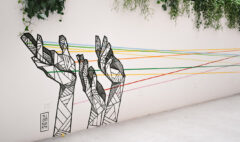The Joy of Kilometers
Greetings. In the interest of full disclosure I must admit that I love kilometers. Absolutely adore them. The simple yet elegant measure of distance used by a large percentage of the world's people. 1K. 1,000 meters. A delightfully round number anyway you look at it, filled with logic that is hard to argue with. And if you were watching the Olympics in the past three weeks you know that its organizers must also love them because they have based the distances of almost every race on some part or number of kilometers. There was the 100 meters (one tenth of a kilometer), the 200 meters (two tenths), the 400 meters, 800 meters, 1,500 meters, 5,000 meters (five kilometers) and 10,000 meters (ten kilometers) which is also known here as a "Swedish mile." And each of these distances is neatly tied to the beauty of kilometers.
Cool. Clear. Logical. Tidy. Kilometers.
The only exception is the marathon–but who am I to argue with a few thousand years of Greek history.
Yet this isn't the real reason why I love kilometers. Truth be told I love kilometers because they are so darn short and drives across countries like Sweden seem to be faster than drives across countries measured in miles. So our trip from Vassviken on the North Sea to Stockholm on the Baltic–a journey or roughly 500 kilometers (or 310 miles)–seemed much faster as I watched the odometer spin with the joyful speed of kilometers. And driving at a speed of 120 kilometers per hour–which is the highest posted speed in Sweden–meant that we were covering two kilometers every minute or a tenth of a kilometer every three seconds. Which gave me the sense that I was covering a lot more ground as the exits and towns flew by.
And even though I wasn't actually going any farther or faster than the equivalent number of miles, my sense of real progress and driving accomplishment seemed greater.
Which got me thinking about what it would take to give all of our customers and employees a greater sense of progress and accomplishment in all the things that really matter to them. And a faster sense of progress as well.
We win in business and in life when we make time and distance seem to fly by.
Cheers!
P.S. As further confirmation that Swedes like logical systems of measurement, it's worth noting that the world's simplest temperature scale was invented by the Swedish astronomer Anders Celsius in the 1700's.







